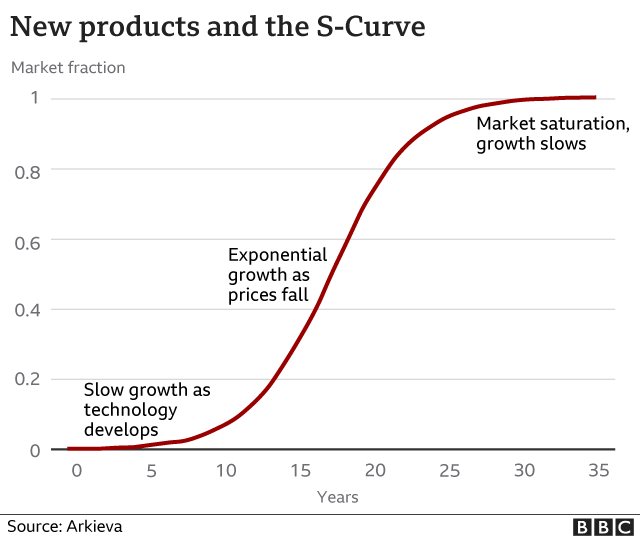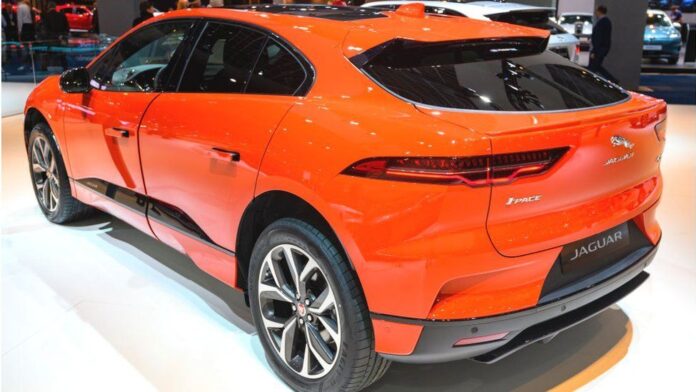We are in the middle of the biggest revolution in motoring since Henry Ford’s first production line started turning back in 1913. And it is likely to happen much more quickly than you imagine.
Many industry observers believe we have already passed the tipping point where sales of electric vehicles (EVs) will very rapidly overwhelm petrol and diesel cars. It is certainly what the world’s big car makers think. Jaguar plans to sell only electric cars from 2025, Volvo from 2030 and last week the British sportscar company Lotus said it would follow suit, selling only electric models from 2028. it isn’t just premium brands. General Motors says it will make only electric vehicles by 2035, Ford says all vehicles sold in Europe will be electric by 2030 and VW says 70% of its sales will be electric by 2030.
Many governments around the world are even setting targets to ban the sale of petrol and diesel vehicles which impetus to the process. But what makes the end of the internal combustion engine inevitable is a technological revolution. And technological revolutions tend to happen very quickly. The internet, like all successful new technologies, did not follow a linear path to world domination. It didn’t gradually evolve, giving us all time to plan ahead.
Its growth was explosive and disruptive, crushing existing businesses and changing the way we do almost everything. And it followed a familiar pattern, known to technologists as an S-curve. It’s actually an elongated S. The idea is that innovations start slowly, of interest only to the very nerdiest of nerds. EVs are on the shallow sloping bottom end of the S here. For the internet, the graph begins at 22:30 on 29 October 1969. That’s when a computer at the University of California in LA made contact with another in Stanford University a few hundred miles away. The researchers typed an L, then an O, then a G. The system crashed before they could complete the word “login”. We saw the same pattern of a slow start, exponential growth and then a slowdown to a mature market with smartphones, photography, even antibiotics.

The internal combustion engine at the turn of the last century followed the same trajectory. So did steam engines and printing presses. And electric vehicles will do the same. In fact they have a more venerable lineage than the internet. The first crude electric car was developed by the Scottish inventor Robert Anderson in the 1830s. But it is only in the last few years that the technology has been available at the kind of prices that make it competitive.
General Motors’ now infamous EV1 cost a billion dollars to develop but was considered a dud by GM, which crushed all but a handful of the 1,000 or so vehicles it produced. The EV1’s range was dreadful – about 50 miles for a normal driver – but Mr Willson was won over. “I remember thinking this is the future,” he told me. He says he will never forget the disdain that radiated from fellow Top Gear presenter Jeremy Clarkson when he showed him his first electric car, a Citroen C-Zero, a decade later. How things have changed.
Mr Willson says he has no range anxiety with his latest electric car, a Tesla Model 3.
He says it will do almost 300 miles on a single charge and accelerates from 0-60 in 3.1 seconds. “It is supremely comfortable, it’s airy, it’s bright. It’s just a complete joy. And I would unequivocally say to you now that I would never ever go back. “We’ve seen massive improvements in the motors that drive electric vehicles, the computers that control them, charging systems and car design. But the sea-change in performance Mr Willson has experienced is largely possible because of the improvements in the non-beating heart of the vehicles, the battery.
Just a decade ago, it cost $1,000 per kilowatt hour of battery power, says Madeline Tyson, of the US-based clean energy research group, RMI. Now it is nudging $100 (£71). That is reckoned to be the point at which they start to become cheaper to buy than equivalent internal combustion vehicles. But, says Ms. Tyson, when you factor in the cost of fuel and servicing – EVs need much less of that – many EVs are already cheaper than the petrol or diesel alternative. At the same time energy density – how much power you can pack into each battery – continues to rise. They are lasting longer too. Last year the world’s first battery capable of powering a car for a million miles was unveiled by the Chinese battery maker, CATL.
As soon as electric vehicles become cost-competitive with fossil fuel vehicles, the game will be up. That’s certainly what Tesla’s self-styled techno-king, Elon Musk, believes. Last month he was telling investors that the Model 3 has become the best-selling premium sedan in the world, and predicting that the newer, cheaper Model Y would become the best-selling car of any kind. “We’ve seen a real shift in customer perception of electric vehicles, and our demand is the best we’ve ever seen,” Mr Musk told the meeting.
There is work to be done before electric vehicles drive their petrol and diesel rivals off the road. Most importantly, everyone needs to be able charge their cars easily and cheaply whether or not they have a driveway at their home.
ANALYSIS
-This article discusses electric vehicles and what is going to make them the future of driving. For one thing it talks about the “takeover” trend that all successful technologies have been through; most technologies that will one day flood the house of every citizen, have a slow trial and error type of start. They are riddled with problems and breakthroughs until it is functional, safe, affordable, and convenient for the average consumer. In the article they discuss some of the histories of electric vehicles and what technologies have allowed for them to progress. Issues like: changes in the battery to fix range anxiety, material breakthroughs to create an overall lighter car, charge speed, and charging stations being accessible though out every community. As the electric car is making huge strides in their technology advancements, most companies and those who watch the markets and understand them all predict that same thing… electric cars will be the future. The reason I liked this article is it puts into perspective about how these things work, and what engineers and scientists are doing to make the future a reality. The article also gives me great confidence in the future of electric and fully autonomous vehicles, which makes me even more excited to design for the autonomous vehicle, as I feel I’m contributing to something greater than myself.-




